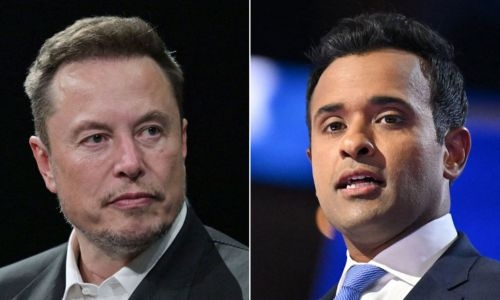Vivek Ramaswamy Proposes Sweeping Cuts to Federal Jobs, Teaming Up with Elon Musk for Government Overhaul
TDT | Manama
The Daily Tribune – www.newsofbahrain.com
Email: mail@newsobahrain.com
During a Florida rally, Indian-American politician Vivek Ramaswamy recently announced ambitious plans to significantly reduce the federal workforce in the United States. Appointed alongside Tesla CEO Elon Musk to lead the newly created Department of Government Efficiency, Ramaswamy's remarks echoed a bold vision for transforming the nation's bureaucracy. He emphasized the need for a drastic approach, stating, “Elon Musk and I are in a position to start the mass deportations of millions of unelected federal bureaucrats out of the DC bureaucracy. That, too, is how we will save this country.”
Ramaswamy's proposed cuts come from a belief that a more efficient government can be achieved by streamlining operations and reducing the number of federal employees. His choice of language, particularly the phrase “mass deportations,” was both striking and controversial, raising eyebrows among political analysts and fostering significant debate about the implications of such a drastic move. “We are going to be taking it to that bureaucracy,” he proclaimed, characterizing their efforts as a necessary intervention to curb what he views as an overly bloated and ineffectual government.
With high-profile partners like Musk, known for his disruptive influence in the tech industry, Ramaswamy believes they can bring a transformative energy to federal governance. “I don't know if you've got to know Elon yet, but he doesn't bring a chisel. He brings a chainsaw,” Ramaswamy stated, illustrating the aggressive tactics they plan to employ against what he calls bureaucratic inefficiencies. This metaphor implies that their approach will not only prioritize cutting jobs but will also seek to fundamentally reshape the government's operations, potentially reducing regulations and increasing privatization.
However, the proposal has drawn criticism from those concerned about the broader ramifications of such cuts. Skeptics warn that eliminating federal jobs could lead to significant disruptions in essential government services that affect millions of Americans, from healthcare and education to public safety. “This is not just about numbers; it’s about people’s lives and the functions that protect our democracy,” said political commentator Lisa Choi. Critics argue that Ramaswamy’s plan could result in a larger void in governance, risking the undermining of crucial services that rely on experienced personnel and institutional knowledge.
As Ramaswamy moves forward with these ambitious plans, he faces considerable political challenges. The current polarized environment in Washington means that any drastic changes will likely encounter substantial resistance from both Democrats and some Republicans. Ramaswamy's efforts will require not just a solid strategy but also a coalition of support from various stakeholders who share his vision for a leaner government. Whether he can translate this bold rhetoric into actionable reforms that resonate with the American public remains to be seen, but one thing is clear: Ramaswamy is poised to become a significant player in the ongoing discourse around government reform in the United States.
Related Posts

